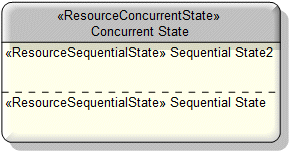Resource concurrent state (UPDM - NAF aliases)

A Resource Concurrent State is a proprietary element that is required to model UPDM in Modeler.
Creation
To create a Resource Concurrent State:
• From a Resource State Machine: right-click the Resource State Machine, point to New, point to NAF, and then click Resource Concurrent State.
• From an NSV-10b Resource State Transition Description: click the  Resource Concurrent State button, and then click in free space on the diagram.
Resource Concurrent State button, and then click in free space on the diagram.
 Resource Concurrent State button, and then click in free space on the diagram.
Resource Concurrent State button, and then click in free space on the diagram.To create a new compartment on a Resource Concurrent State:
• From a Resource Concurrent State: right-click the Resource Concurrent State, point to New, point to NAF, and then click Resource Sequential State.
• From an NSV-10b Resource State Transition Description: click the  Resource Concurrent Compartment button, and then click the Resource Concurrent State.
Resource Concurrent Compartment button, and then click the Resource Concurrent State.
 Resource Concurrent Compartment button, and then click the Resource Concurrent State.
Resource Concurrent Compartment button, and then click the Resource Concurrent State.Appearance
When shown on an NSV-10b Resource State Transition Description, a Resource Concurrent State appears as follows:

Relationships
The following relationships are of importance to a Resource Concurrent State:
• UML Transitions link a Resource Concurrent State to other State Diagram elements (NSV-10b Resource State Transition Description).
• Function elements can be invoked by a Resource Concurrent State: right-click the Resource Concurrent State, point to Links, and then click Do Function.
• Resource Operation elements can be invoked by a Resource Concurrent State: right-click the Resource Concurrent State, point to Links, and then click Do Resource Operation.
• Resource State Machine elements can be invoked by a Resource Concurrent State: right-click the Resource Concurrent State, point to Links, and then click Do Resource State Machine.
The following sections provide information about how a Resource Concurrent State is used in the model.
Create a Resource Concurrent State from
Create from a Resource Concurrent State
In addition to the UPDM elements that can be created from all UPDM elements (Alias, Definition, Information and Metadata):
 Resource Sequential State- as a compartment.
Resource Sequential State- as a compartment.Shown on these diagrams, tables and matrices
In addition to the NAV-2 Integrated Dictionary and NTV-1 Standards Profile, which can show all UPDM elements:
UPDM writeable properties
The following writeable properties are available on the Resource Concurrent State tab of a Resource Concurrent State element's Property Pages:
• URI


